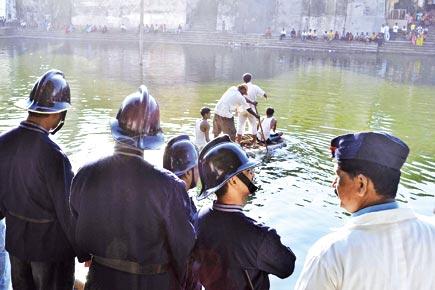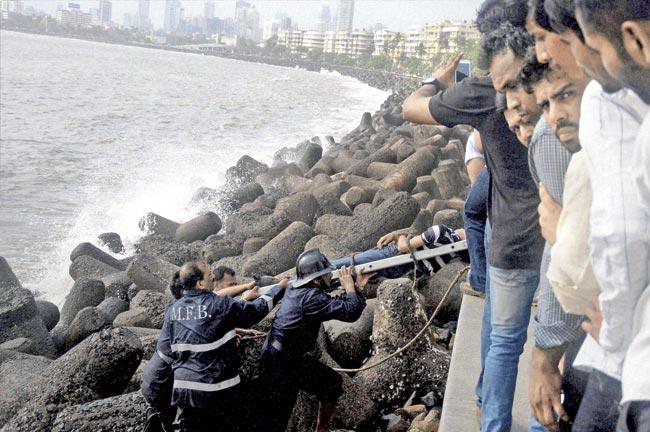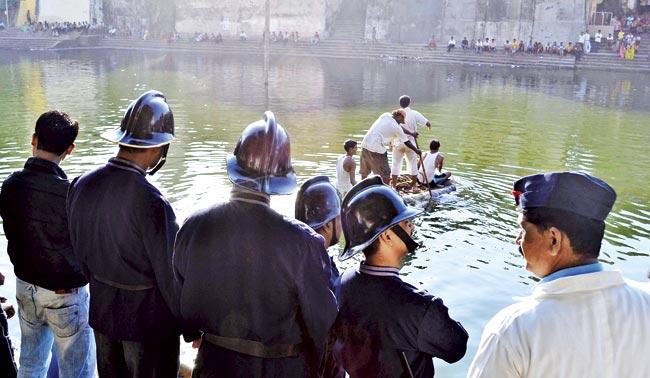Firemen who are often required to part of flood rescue operations, and are posted at beaches during the monsoons don’t need to know swimming; half of the 2,500 men in the fire brigade cannot swim

How’s this for irony? Police aspirants who will probably never have to run five kilometres in one go are made to do so, and several die in the process; but those aspiring to be firemen —who are often required to part of flood rescue operations, and are posted at beaches during the monsoons don’t need to know swimming.
ADVERTISEMENT

Two boys fell into the water after huge waves lashed Marine Drive. While one of them was rescued, the other died. Fire brigade officers are seen here pulling out the body. File pic
And, if you thought lessons were learnt after the 2005 deluge in the city, think again. Should another such tragedy befall Mumbai, remember not to go to the firemen for help, for more than half of them do not know how to swim.
With the cases of people drowning increasing every year, the BMC has deployed lifeguards at almost all the beaches, but not at places like Marine Drive or Gateway of India. Even today, when someone falls in the water in these areas, the fire brigade is called and the fireman on duty has to rush to the spot, even if he doesn’t know swimming.

Fire brigade personnel look on as a drowning man is rescued at Banganga. File pic
Keeping all this in mind, concerned citizens and corporators have voiced the need for making knowledge of swimming mandatory for recruitment, and training all the existing 2,500 firemen in the Mumbai Fire Brigade, more than 1,300 of whom do not know how to swim. What’s more, speaking to mid-day, firemen and their unions agreed to the proposal, but the BMC has said making it a pre-condition is not possible.
Special teams
Speaking on condition of anonymity, a senior fire official said, “A specialised ‘flood and rescue team’ was set up in 2006, a year after the 26 July deluge, but no fireman is interested in being a part of it.
Two things hold them back most of them do not know how to swim, and the lack of incentives ensures that signing up for it means taking up extra workload, without any additional compensation.”
This, he said, is despite the team proving useful in the past. “22 members of this team were sent to flood-affected areas in Bihar in 2008, to carry out rescue operations. It was the team’s first rescue operation outside Maharashtra,” he added.
MNS corporator from Shivaji Park, Sandeep Deshpande, recalled the deaths of more than 600 people in the city in the 2005 cloudbursts, and deaths due to drowning at various beaches. “The city must be prepared. It is necessary for every fireman to know how to swim, and those who don’t, must be trained,” said Deshpande.
Firemen unions agree. “The percentage of firemen who do not know swimming must be over 50. Firemen must know how to swim, and the administration must put knowledge of swimming as a pre-condition for recruitment, along with all the other conditions and requirements,” said Advocate Sukhadev Kashid, general secretary, Mumbai Fire Service Union.
Sanjay Kamble-Baperkar, general secretary of the Agnishaman Bahujan Karmachari Sangh, agreed with the over 50% figure and said, “The fire brigade is part of disaster management and firemen should know how to swim. The civic administration should train them after recruiting them as firemen.”
BMC speak
The civic administration, however, indicated that there is no need for all firemen to know how to swim. Sanjay Deshmukh, additional municipal commissioner, who handles the Fire Brigade department, said, “We cannot put knowledge of swimming as a condition to become a fireman.
No such pre-condition exists anywhere in India, including the defence forces. They train recruits after they are hired.” Asked if the BMC does that, he replied, “We deploy only those firemen who know how to swim, at beaches and areas like Marine Drive. We train firemen at the civic swimming pool.”
 Subscribe today by clicking the link and stay updated with the latest news!" Click here!
Subscribe today by clicking the link and stay updated with the latest news!" Click here!






